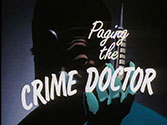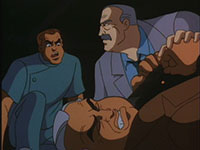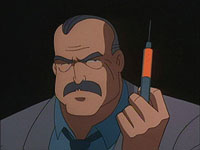|
||
|
| Credits | Cast | |
Story by Mike Barr & Loren Bright Teleplay by Randy Rogel & Martin Pasko Directed by Frank Paur Music by Shirley Walker Animation by Dong Yang |
Kevin Conroy as Bruce Wayne Efrem Zimbalist, Jr. as Alfred Diana Muldaur as Dr. Leslie Thompkins John Vernon as Rupert Thorne Rodger Bumpass as Hoffman |
Joseph Campanella as Matthew Thorne Linda Dangcil as Woman George Dzundza as Chubb Gary Kroeger as Beechum |
|
It's not that stories that center on such people and settings are grindingly prosaic (though it's always a dangerous choice to foreground such elements in an animated superhero show). In skilled artistic hands the very plainness of a crummy apartment or office and the people who live and work there can heighten our identification with the drama. Rather, there is always a temptation to reassure the audience by showing that the obviously ordinary and decent human beings who inhabit such stories can never fall far enough to become entirely lost. But when the author surrenders to this temptation, we are spared (or cheated, depending on your point of view) the agony of watching that ordinary person struggle in a situation in which they will not obviously prevail. In Batman, it comes out as the other side of that universe's Calvinistic metaphysic: Where Isley and Nygma and Dent are already damned by aberrant psychologies and so cannot choose but to become monsters, Rossum and Wizard and Earl Cooper, through no virtue of their own, lack the fundamental capacity to become deeply evil. I will grant at least two exceptions to this generalization: Jervis Tetch of "Mad as a Hatter" and Stromwell of "It's Never Too Late," and their defining episodes are much the better for it. But Matthew Thorne is no exception to the prevailing rule. The key problem with "Paging the Crime Doctor" is that its narrative architecture is simply too pat. It contains only two characters in a position to suffer the crisis of conscience that the story is obviously designed to dramatize. Leslie Thompkins is Batman's superfluous Jiminy Cricket (her only function that I can discern is to give him advice or instructions that he can then successfully ignore), and there is no chance that Leslie—whose moral certitude is like an Everlasting Gobstopper; you can suck on it and suck on it, and it will never get any smaller—will do anything that isn't insufferably ethical. That leaves Matthew Thorne, and since he is already fallen, there is not much chance he won't change for the better as the story develops. Thus, the situation's sheer predictability drains the drama of much of its potential. That the rest of the story is basically about middle-aged people running through corridors is no relief.
Such a story would also have better connected with Eric Radomski's beautiful title card, which shows a craggy-faced man (who is clearly not Matthew Thorne) in surgical mask and halflight wielding a nasty-looking syringe. This eerie image perfectly captures the ambiguous view we have of doctors, with their capacity both to heal and to inflict horrible and invasive pain, often doing the one while doing the other. The pose and its ambiguity may have its literal counterpart in the episode when Matthew prepares a deadly syringe, but it is actually cheapened by the echo because Matthew seems already to have exhausted his capacity for evil. But the same image, if tied to a doctor who has not yet begun to measure out the distance of that unbroken thread connecting Schweitzer to Mengele, would have had far more resonance. The paradox is that Matthew Thorne is not a bad man, but neither has he very far to rise. When a man's soul has this little room to run, there's not much fun in watching him test its narrow confines. |
|
Production Notes Frank Paur: "Everybody calls it 'The Geezer Show.' I had a problem with the part where these old people are leaping across the rooftops. Now, in the model sheets Leslie looks like Granny in the Tweety Bird cartoons, and we have the script calling for all of these physical things. So, I went to Bruce and asked if we couldn't redesign the character to make her a little more sturdy. But Bruce believes that once you establish a character, this is the character you have to go with. So what I did was have one of our guys go through all the action poses with Leslie so she'd be a little more sturdy. At least I got that much past him." |
|
Related Episodes |
What Others Are Saying ... |
| Back to On Leather Wings |
Forward to Perchance to Dream |



